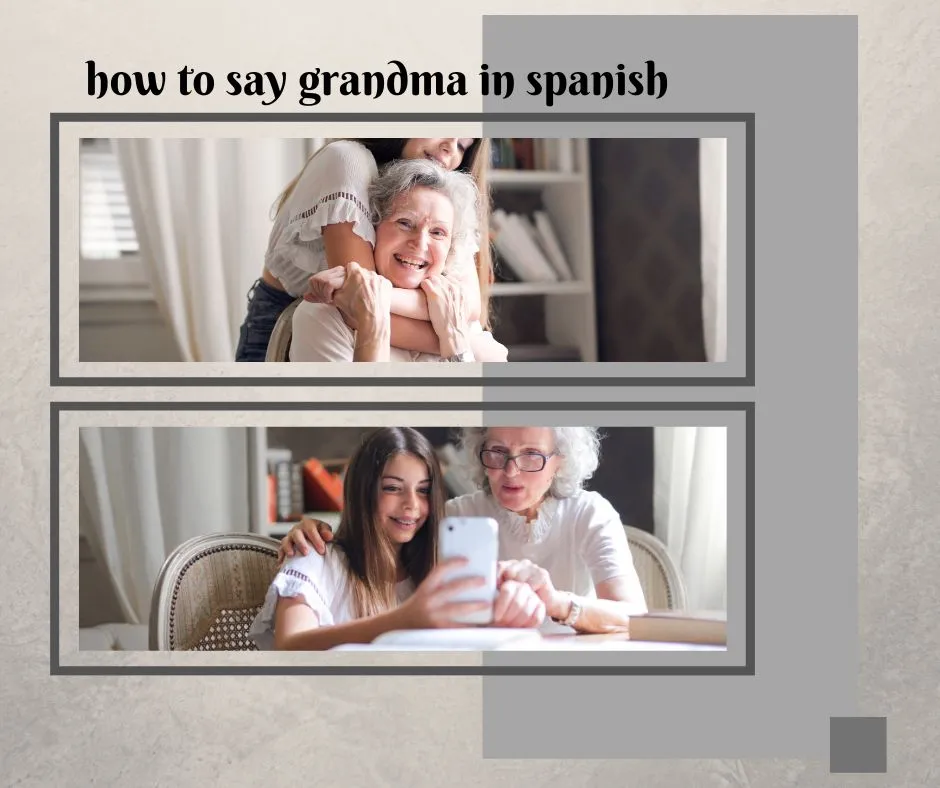How to Say Grandma in Spanish
Grandma in Spanish – How to Say It Right
Grandma in Spanish is one of the most widely used Spanish phrases that you might ever come across. If you are looking for a way to communicate with Grandma in Spanish, then you’re in luck!

In Spanish, Grandma is known as “Abuela” or “Abuelita,” depending on how you want to address her.
While there are other variations of the word, “Abuela” and “Abuelita” are the most commonly used terms in Spanish when referring to Grandma.
In this blog post, we’ll go over different ways to address Grandma in Spanish and how to say it correctly.
The word “abuela” (ah-bweh-lah) is the Spanish word for “grandma.” In Spanish-speaking families, grandmothers often play a central role in the family, providing love, guidance, and support to their children and grandchildren.
The Different Ways to Say Grandma in Spanish
In Spanish, there are several ways to say “grandma” depending on the context or the country you are in. Here are some of the most common ways to say “grandma” in Spanish:
1. “Abuela”
(ah-bweh-lah) – This is the most common and universal way to say “grandma” in Spanish. It is used in most Spanish-speaking countries and is understood by all.
2. “Abuelita”
(ah-bweh-lee-tah) – This is a diminutive form of “abuela,” which means “little grandma.” It is often used as a term for endearment and affection.
3. “Mamá”
(mah-mah) – This literally means “mother,” but it can also be used to refer to a grandmother, especially in a more informal or familiar setting.
4. “Nonni”
This is the Spanish word for Grandma, It is also used in some parts of Spain and Latin America.
5. “Abuela materna”
(ah-bweh-lah mah-tehr-nah) – This means “maternal grandmother.” It is used to differentiate between the mother’s mother and the father’s mother.
6. “Abuelo”
(ah-bweh-loh) – This means “grandfather” in Spanish, but it can also be used to refer to a grandmother in some colloquial or regional contexts, depending on the country or region.
It’s important to note that some of these words may have different meanings or connotations in different countries or regions, so it’s always a good idea to ask or clarify when in doubt.
Regional Differences in Saying Grandma in Spanish

In Spanish, there are regional differences in the way “grandma” is said, and certain words or phrases may be more commonly used in certain countries or regions. Here are some examples of regional differences in saying “grandma” in Spanish:
1. In Spain, “Abuela” (ah-bweh-lah) is the most common way to say “grandma,” but “nonni” is also used in some parts of the country.
2. In Mexico and other parts of Central America, “abuela” (ah-bweh-lah) is commonly used, but “mamá” (mah-mah) can also be used in a more informal or familiar setting.
3. In South America, “abuela” (ah-bweh-lah) is widely used, but in some countries like Argentina, “nonni” is also used.
4. In the Caribbean, “abuela” (ah-bweh-lah) is the most common way to say “grandma.”
5. In some countries like Chile, “abuela” (ah-bweh-lah) is commonly used, but “abuelita” (ah-bweh-lee-tah) is also used as a term of endearment.
It’s important to note that these are just general observations and may vary depending on the specific country or region. Also, the context of the conversation and the relationship between the speaker and the listener can also affect the choice of words.
In general, it’s always best to ask or clarify if you’re unsure of the appropriate way to address someone in a specific context.
Formal and Informal Ways of Saying Grandma in Spanish
Here are a few examples of how “grandma” is said in Spanish in different contexts:
1. Formal or Respectful
“Buenas tardes, abuela” (bweh-nas tahr-des, ah-bweh-lah) – “Good afternoon, grandma”
2. Informal or Affectionate
“Hola, mamá” (oh-lah, mah-mah) – “Hello, grandma”
3. Familiar or Close Relationship
“Nonni, ¿cómo estás?” (non-nee, koh-moh ehs-tahs) – “Grandma, how are you?”
4. Maternal Grandmother
“Abuela materna, ¿quieres ir al parque con nosotros?” (ah-bweh-lah mah-tehr-nah, kee-ehr-es eer ahl pahr-keh kohn noh-soh-trohs) – “Maternal grandmother, do you want to go to the park with us?”
5. Paternal Grandmother
“Abuela paterna, ¿quieres ir al parque con nosotros?” (ah-bweh-lah pah-tehr-nah, kee-ehr-es eer ahl pahr-keh kohn noh-soh-trohs) – “Paternal grandmother, do you want to go to the park with us?”
It’s important to note that in some Spanish-speaking countries, different words or phrases may be used to refer to “grandma” depending on the region or context.
It’s always best to ask or clarify if you’re unsure of the appropriate way to address someone in a specific context.
The Best Way to Say Grandma in Spanish
The best way to say “grandma” in Spanish will vary depending on the context and the relationship between the speaker and the listener.
However, “Abuela” (ah-bweh-lah) is the most universally understood and accepted way to say “grandma” in Spanish.
It is used in most Spanish-speaking countries and is considered a formal and respectful way to address a grandmother.
“Abuelita” (ah-bweh-lee-tah) is also a common and accepted way to say “grandma” in Spanish, it is often used as a term of endearment and affection.
In informal settings or with close family members, it is also common to use a more familiar or affectionate term like “mamá” (mah-mah) or “Nonni”
It is important to note that while “Abuela” is a widely used and accepted term, the context and relationship between the speaker and the listener may affect the choice of words.
It’s always best to ask or clarify if you’re unsure of the appropriate way to address someone in a specific context.
Conclusion
In conclusion, “grandma” in Spanish is most commonly referred to as “abuela” (ah-bweh-lah). However, there are several other ways to say “grandma” in Spanish, depending on the context, country, or the relationship between the speaker and the listener.
“Abuelita” (ah-bweh-lee-tah), “mamá” (mah-mah), “nonni” are also common ways to say “grandma” in Spanish.
It is important to note that these different words or phrases may have different meanings or connotations depending on the country or region you are in. Therefore, it’s always a good idea to ask or clarify when in doubt to make sure you address someone appropriately.
CSN Team


